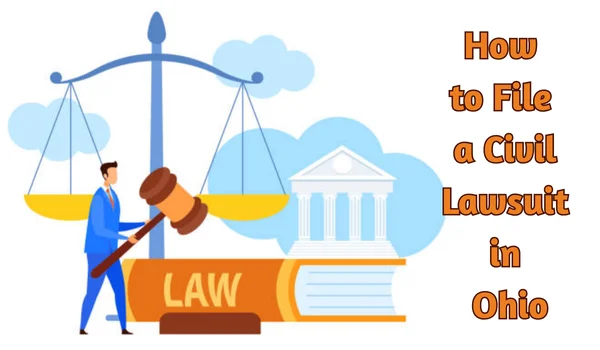Filing a civil lawsuit in Ohio involves a structured process governed by the Ohio Rules of Civil Procedure. Whether you’re pursuing a claim for breach of contract, personal injury, property damage, or other civil matters, understanding the procedural steps is crucial. Below is a comprehensive guide to help you navigate the process.
Determine the Appropriate Court
Before initiating a lawsuit, identify the correct court based on the amount in controversy and the nature of the claim:

- Small Claims Court: Handles disputes involving amounts up to $6,000. This court is designed for individuals to represent themselves without the need for an attorney.
- Municipal or County Courts: Jurisdiction varies; typically, these courts handle claims up to $15,000.
- Court of Common Pleas: Handles cases involving amounts exceeding $15,000.
Ensure you file in the correct jurisdiction to avoid delays or dismissals.
Prepare the Complaint
The complaint is the foundational document that outlines your allegations and the relief sought. Under Ohio Rule 3(A), a civil action is commenced by filing a complaint with the court. It’s essential to include:
- Caption: Court name, case number (if known), and party names.
- Statement of Jurisdiction: Explain why the court has jurisdiction over the matter.
- Factual Allegations: Detail the events leading to the dispute.
- Legal Claims: Specify the legal basis for your claims.
- Relief Sought: Clearly state the remedy or damages you are requesting.
For guidance on drafting a complaint, refer to the Ohio Rules of Civil Procedure and local court rules.
File the Complaint with the Court
Submit the original complaint and any required copies to the Clerk of Courts in the appropriate jurisdiction. Ensure you include:
- Filing Fee: Fees vary by court and case type. For instance, Franklin County Municipal Court charges a filing fee for civil cases.
- Civil Case Filing Cover Sheet: This form provides the court with essential information about the case.
Some courts may offer electronic filing options; check with your local court for available services.
Serve the Defendant
After filing, you must notify the defendant by serving them with a copy of the complaint and a summons. In Ohio, service can be effectuated through:
- Certified Mail: Sent by the Clerk of Courts.
- Personal Service: Delivered by a sheriff, process server, or another authorized individual.
Proper service is crucial, as it establishes the court’s jurisdiction over the defendant.
Await the Defendant’s Response
The defendant typically has 28 days to respond to the complaint. Responses may include:
- Answer: Addressing each allegation and presenting defenses.
- Motion to Dismiss: Challenging the legal sufficiency of the complaint.
- Counterclaim: Asserted by the defendant against the plaintiff.
Failure to respond can result in a default judgment in favor of the plaintiff.
Engage in Discovery
Discovery is the pre-trial phase where both parties exchange information:
- Interrogatories: Written questions requiring written answers.
- Requests for Production: Demands for documents and evidence.
- Depositions: Oral questioning of witnesses under oath.
This phase allows both sides to gather evidence and assess the strengths and weaknesses of the case.
Pre-Trial Motions and Settlement
Before trial, parties may file motions to resolve issues or narrow the scope of the case. Settlement discussions are also common at this stage, aiming to resolve the dispute without a trial.
Trial
If the case proceeds to trial, both parties present their evidence and arguments. In Ohio, civil trials are typically heard by a judge, though parties may request a jury trial in certain cases.
Post-Trial Motions and Appeals
After the trial, the losing party may file post-trial motions or appeal the decision to a higher court. Appeals must be based on legal errors made during the trial.
Additional Resources
- Ohio Rules of Civil Procedure: Comprehensive rules governing civil litigation in Ohio.
- Ohio Court of Claims: Handles claims against the state of Ohio.
- Local Court Rules: Specific rules for individual counties or municipalities.
Conclusion
Filing a civil lawsuit in Ohio requires careful adherence to procedural rules and timelines. While individuals can represent themselves, consulting with an attorney can provide valuable guidance and increase the likelihood of a favorable outcome. Ensure you are informed about the specific requirements of the court where your case is filed.

 Oliver Johnson is LawScroller’s Senior Legal Correspondent specializing in civil litigation, class actions, and consumer lawsuit coverage. He breaks down complex settlements and court decisions into clear, practical guidance for readers.
Oliver Johnson is LawScroller’s Senior Legal Correspondent specializing in civil litigation, class actions, and consumer lawsuit coverage. He breaks down complex settlements and court decisions into clear, practical guidance for readers.